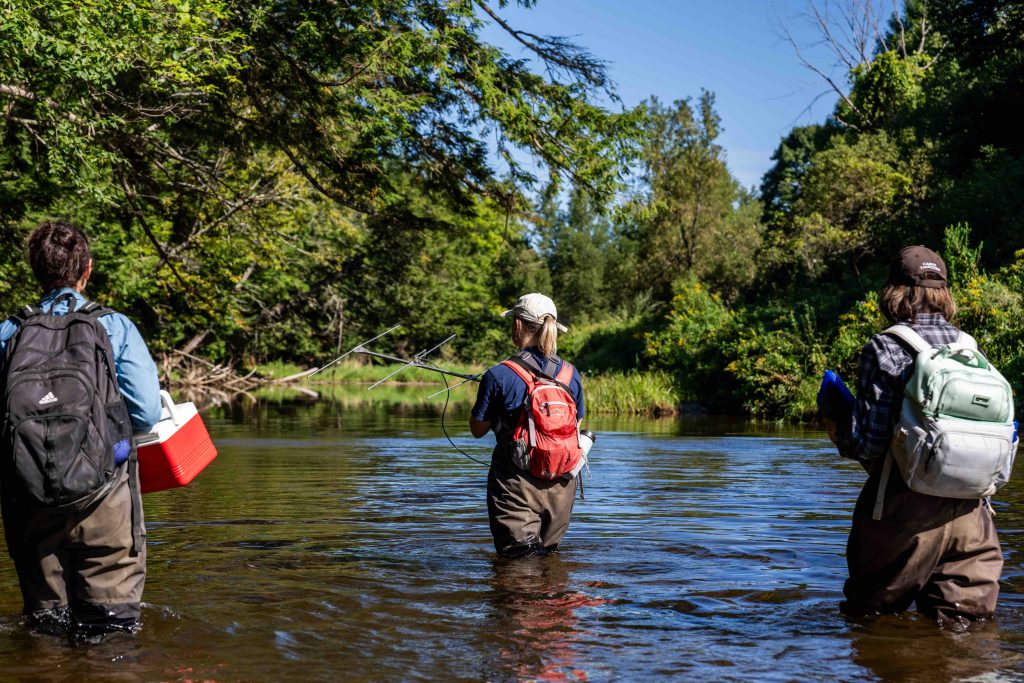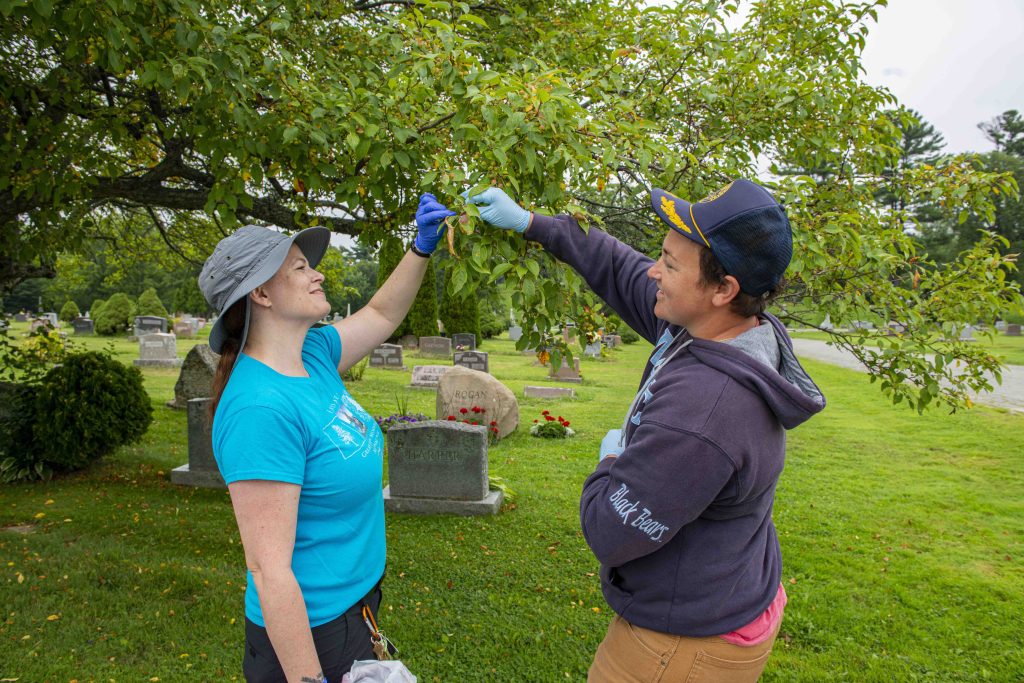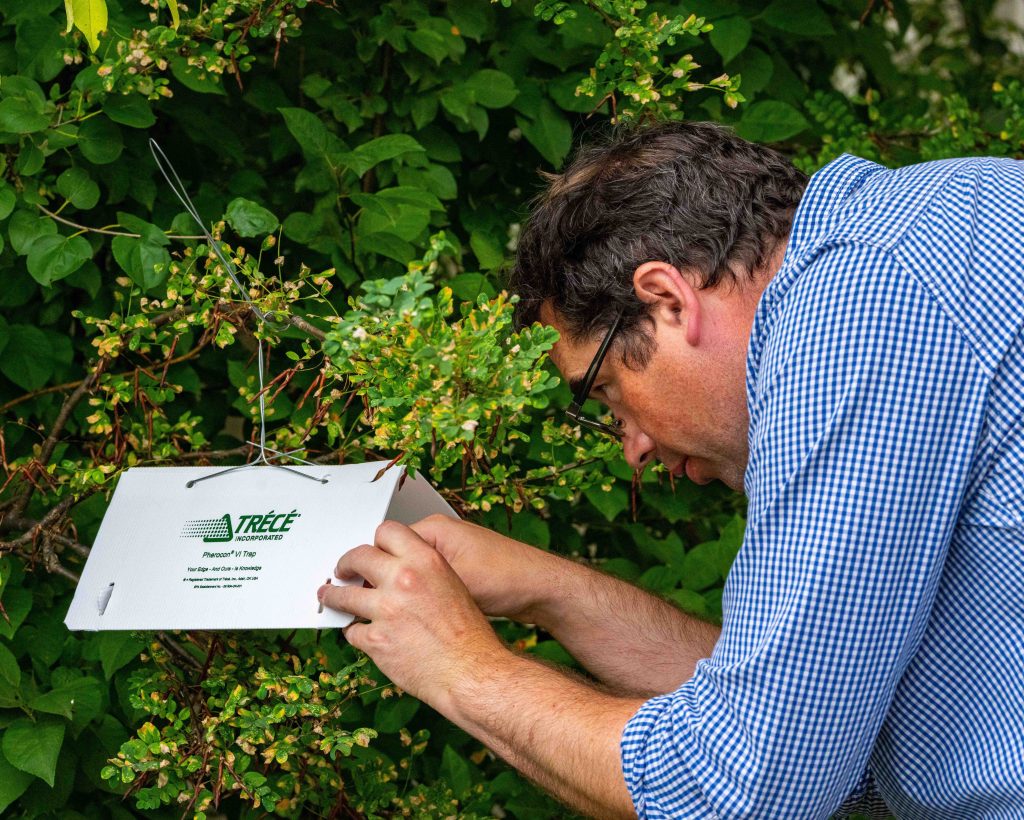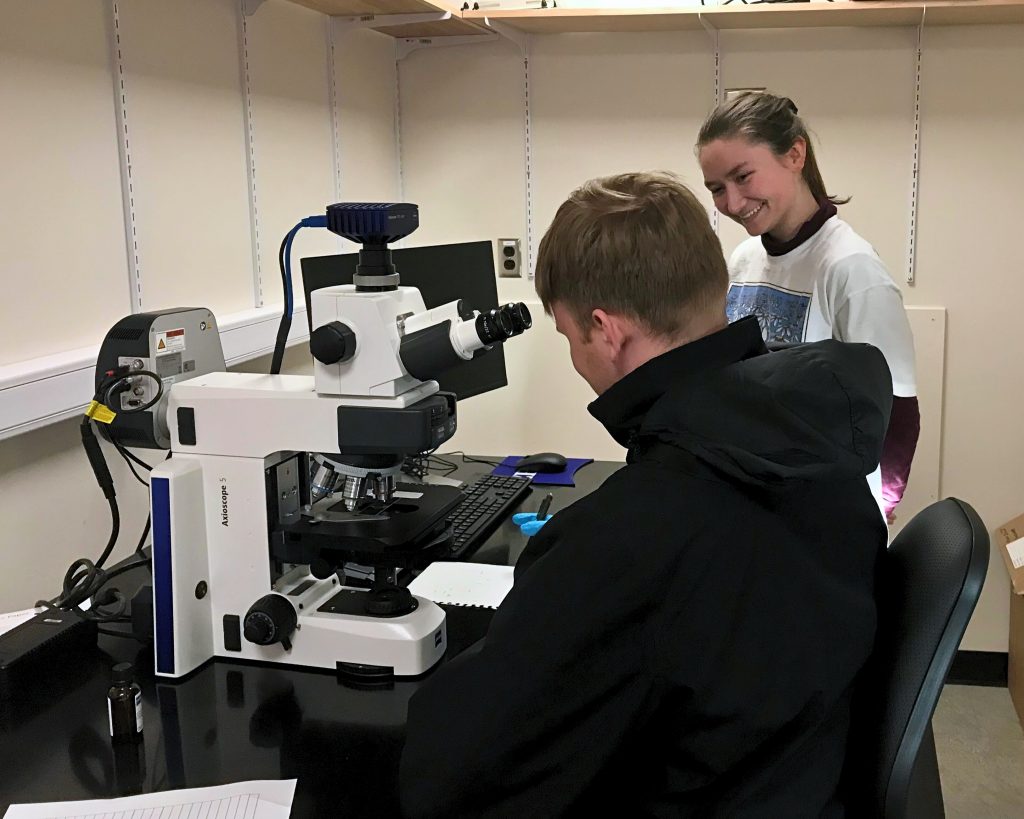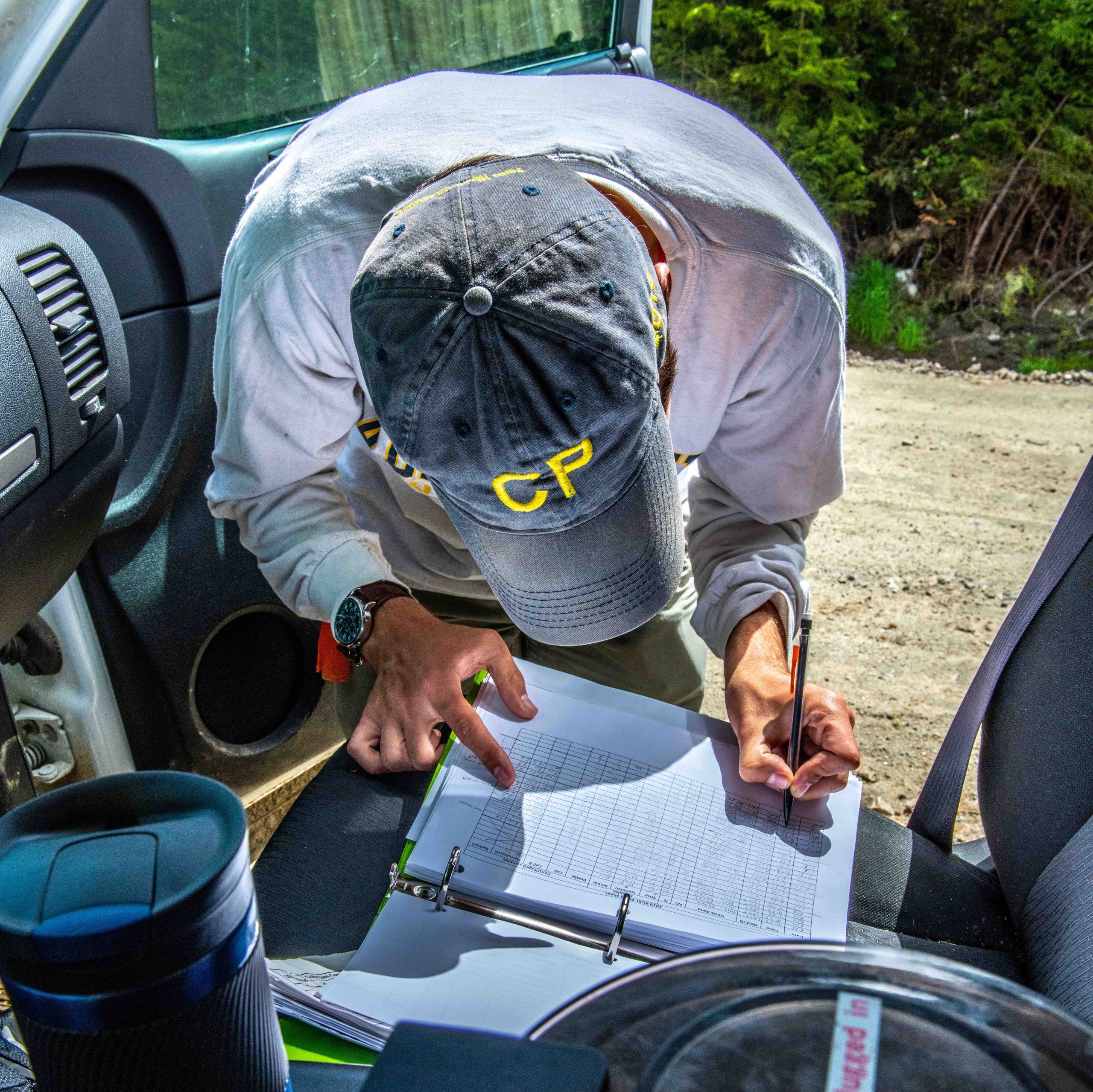UMaine School of Biology and Ecology Graduate Program
Welcome from the SBE Graduate Coordinator
Welcome to the webpage for the School of Biology and Ecology’s graduate programs! We are a broad, interdisciplinary unit with faculty expertise spanning systems, scales, and all five kingdoms of life. Whether you’re interested in muscle development, plant biogeography, mammal thermoregulation, wood turtle eDNA, or integrated pest management, our graduate programs in Biological Science and Entomology take an integrative approach to prepare students for careers in basic and applied science, education, industry, and beyond.
As a rural R1 university, the University of Maine blends a vibrant academic culture with a small town feel. Our diverse faculty and graduate students are engaged in world-class research that spans the globe, but we also value work-life balance and strive to prepare students for both academic and non-academic careers. Located on Marsh Island in the Penobscot River, our campus is situated within easy access to mountains, forests, rivers, and the ocean, providing natural laboratories for research and learning, as well as opportunities for outdoor recreation.
Graduate students in SBE have access to numerous professional development programs both in the School and across campus. You can develop your teaching skills and pedagogy training through the Center for Innovation in Teaching and Learning, or learn more about grant proposal writing from the Raymond H. Fogler Library. The SBE Grad Organization and our weekly departmental seminars and journal clubs provide numerous opportunities to network and collaborate with peers. Our graduate students also have the opportunity to connect across disciplinary and institutional boundaries, with numerous research centers including the Climate Change Institute, the Institute of Medicine, the Senator George J. Mitchell Center for Sustainability Solutions, and the Maine Center for Genetics in the Environment.
Current students can find information here regarding comprehensive exams, joint graduate programs, academic appeals, and administrative information, among other resources.
Academic Information
General requirements for M.S. and Ph.D. degrees can be found here. List of courses offered to graduate students by SBE is available here. Upon consultation with their advisory committees, SBE graduate students can also take courses offered by other departments. In addition to the general requirements, all Ph.D. students are required to take Comprehensive Examinations in their field. When designing the graduate program, students should give consideration to the disciplines and facilities related to SBE where they may wish to complete a Joint Graduate Program.
Doctoral students can earn an Appointment to the Graduate Faculty.
If a conflict should arise between a graduate student and his or her advisory committee, the student may make an Academic Appeal.
Graduate Students Association (GSA): The GSA is a board with elected officers and a graduate student representative from every department or program on campus. Opportunities for Graduate students through the GSA include travel and research grants, free laptop loans, funding for clubs and organizations, and research exposure at an annual Graduate Research Exposition in spring. Anyone may attend GSA meetings, which are every other Thursday from 12-1:00, but a representative from each department or program must attend at least 75% of board meetings to make that department eligible for GSA grant funding. In addition, Graduate students can become involved with various University committees and work toward improving graduate student life at the University.
Logistical and administrative information for graduate students can be found here.
Recommended Offline Resources
- The MLA produces two companion pamphlets, “Advice to Universities and Graduate Programs on Graduate Student Rights and Responsibilities” and “Advice to Graduate Students: From Application to Career.”
- Council of Graduate Schools in Washington, DC, produces the booklet, “Research Student and Supervisor: An Approach to Good Supervisory Practice.”
- Joan Bolker’s Writing Your Dissertation in Fifteen Minutes a Day (Holt, 1998)
- Ann Lamont’s Bird by Bird: Some Instructions on Writing and Life (Anchor, 1995)
- Robert L. Peter’s Getting What You Came For: The Smart Student’s Guide to Earning a Master’s or a PhD (Noonday, 1997).
- Eviatar Zerubavel’s The Clockwork Muse: A Practical Guide to Writing Theses, Dissertations, and Books (Harvard UP, 1999).
Here you will find general requirements, as well as specific degree requirements, for the Ph.D. and M.S. degree programs offered by the School of Biology and Ecology.
Program Requirements
The School of Biology and Ecology administers two Master’s degree programs and one Ph.D. degree program: Master of Science in Entomology, Master of Science in Biological Sciences, and Ph.D. in Biological Sciences. The requirements are outlined here:
Requirements for the MS or PhD in Biological Sciences
Qualified candidates for the graduate program in the Biological Sciences should have a Bachelor’s degree in biology, botany, chemistry, ecology, environmental science, natural resources, wildlife biology, zoology, or a similar field. Students with other undergraduate degrees may be required to take additional coursework, either before or during their matriculation. Interested students should read faculty web pages and contact prospective advisors to discuss their interests, qualifications, and the admissions process.
- Graduate Advisory Committee and Program of Study: Each student will be advised by a graduate advisory committee consisting of at least three graduate faculty members for Master’s students or five graduate faculty members for Ph.D. students. The advisory committee should be formed during the first year of graduate study. A Program of Study (POS), approved by the student’s graduate advisory committee, is required for both Master’s and PhD students. For Master’s students, the POS is due before completion of twelve credits or by the third registration, whichever comes first. For PhD students, the POS must be submitted to the Graduate School before the end of the first year of study for students holding a Master’s degree. Those holding only a baccalaureate degree must file the POS before completion of 12 credits or by the third registration, whichever comes first.
- Written Research Proposal and Proposal Defense: A written research proposal must be approved by the student’s advisory committee no later than 12 months from the time of matriculation of an M.S. student or 18 months from the time of matriculation of a Ph.D. student. A public proposal seminar, outlining the research planned or presenting preliminary results, is required.
- Annual Progress Report: A report on the progress of each student is required each year, which will be reviewed by the Graduate Committee. Reports will be due by the second Friday in April each year.
- Credits:MS: A minimum of 30 credits, including thesis credits, are required for the Masters, taken at the graduate level (400 or higher). Students may take 100-300 level courses, but these will not count towards requirements. Students are required to complete at least 12 credits of 500- and/or 600-level course work. A minimum of 6 thesis credits are required, with a maximum of 15 total.
PhD: A minimum of 30 credits, including thesis credits, are required for the doctorate, taken at the graduate level (400 or higher). Up to 30 course credits may be transferred from a Master’s program, and may make no more than half of the doctoral credits. Doctoral students are required to complete at least 12 credits of 500- and/or 600-level course work. A minimum of 6 thesis credits are required, with a maximum of 15 total.
Course Requirements
- Seminar requirement: At least two seminar credits total are required. Any seminar course will qualify as long as it includes a presentation by the student. (Note: EES 598: Ecology and Evolution of Everything may only count as 1 credit towards this requirement, but can be taken multiple times towards the overall credit requirements, and may also count towards an area requirement. BIO 500 does not count towards this requirement).
- Quantitative Methods Requirement: At least 3 credits are required to demonstrate proficiency in quantitative methods. Options include:
- AVS 554 – DNA Sequencing Analysis Lab (2 cr)
- BIO 557/558/559 – R programming language
- BIO 593 – Advanced Biometry (4 cr)
- BMB 502 – Introduction to Bioinformatics (3 cr)
- MAT 586 – Biological Modeling and Simulation (3 cr)
- BIO 509 – Experimental Design (4 cr)
- SIE 510 – Geographic Information Systems Applications (3 cr)
- SIE 512 – Spatial Analysis (3 cr)
- SFR 406 – Remote Sensing of the Forest Environment (3 cr)
- SFR 575 – Advanced Forest Biometrics and Modeling (3 cr)
- STS 437 – Statistical Methods in Research (3 cr)
- Biological Inquiry and Analysis: All students are required to take BIO 500 – Biological Inquiry and Analysis (2 cr), typically in their first semester. Students who took this course at the Masters level who continue on for a PhD are not required to take BIO 500 a second time.
- Professionalism: All students are required to take BIO 505 – Professionalism in Biology (2 cr), or a suitable substitution as approved by the graduate coordinator. Substitute classes must fulfill the Responsible Conduct of Research requirement, as defined by the Graduate School. Continuing doctoral students are not required to re-take this course.
- Thesis or Dissertation Submission and Defense: Master’s students must submit a thesis describing the results of an original research investigation. Doctoral students must submit a dissertation describing the results of an original research investigation, following advancement to candidacy (after completion of the comprehensive examination and proposal). The acceptability of the Master’s thesis or Doctoral dissertation shall be determined in a final oral defense conducted under the supervision of the student’s graduate advisory committee. Preceding the defense, each candidate must present a public seminar describing the results of the research (this is typically scheduled immediately before the defense). A copy of the student’s thesis or dissertation must be made available upon submission of the Tentative Thesis to the Graduate School (at least five business days before the defense). This is typically provided as a printed copy, but may also be shared electronically with the defense announcement.
Additional Requirements for Doctoral Students
- Teaching: All students must have one semester of teaching experience, which may be waived with committee approval and appropriate coursework (e.g., EES 590 – Teaching in Ecology and Environmental Sciences or the CITL Teaching Academy (or equivalent).
- Comprehensive Examinations: Before a student is admitted to candidacy as defined by the Graduate School, they must pass comprehensive written and oral examinations. These examinations can be scheduled no earlier than the end of the third semester of graduate study, must be initiated by the fifth semester, and completed no later than the eighth semester.
The written examination will be given before the oral examination, and will consist of five parts, each representing a distinct subject field. Exam fields will be determined and administered by the advisory committee; each committee member (or an appropriate substitute) typically provides or approves of a reading list of primary literature and/or books. Exam fields are meant to represent broad topics in the biological sciences or application degree concentration (e.g., Community Ecology, Developmental Biology, Bioinformatics). Preparation for these exams typically take at least a semester.
The written exam is typically administered over the course of five days, with one exam field being tested each day. The parameters of each exam are up to the advisory committee member (i.e., length of exam, number of questions, open/closed book). The student is required to pass all five parts of the comprehensive written examination in order to proceed to the oral examination. If the student fails a component of the written exam, they may be re-examined once. The examining committee may require additional coursework before any or all portions of the written are retaken.
The comprehensive oral examination will be administered by the same committee that gave the comprehensive written examination, and may consist of follow-up questions related to the oral exam, further questions about assigned readings or exam field topics, or any other questions the examining committee deems relevant. The examination is considered to have been passed if at least four members of the examining committee consider the performance passing; no more than one dissenting vote can be cast. Students may pass without conditions, may pass conditionally (upon completion of coursework, additional reading, or other work), may retake the oral examination once at a future date, or may fail without taking the exam at a future time. A failed examination prevents admission to candidacy, and the student may no longer continue in the program (students will have the option to transition to a Masters in this case).
Requirements for the MS in Entomology
The MS in Entomology program is designed for students interested in the study of insect ecology, diversity, and management. Qualified candidates for a graduate program in entomology should have a Bachelor’s degree in entomology, biology, botany, chemistry, ecology, environmental science, natural resources, zoology, or a similar field. Students with other undergraduate degrees may be required to take additional coursework. Interested students should read faculty web pages and contact prospective advisors to discuss their interests, qualifications, and the admissions process.
- Seminar course(s) (2 cr minimum). Any seminar course will qualify as long as it includes a presentation by the student. (Note: EES 598: Ecology and Evolution of Everything may only count as 1 credit towards this requirement, but can be taken multiple times towards the overall credit requirements, and may also count towards an area requirement).
- Written Research Proposal and Proposal Defense: A written research proposal must be approved by the student’s advisory committee no later than 12 months from the time of matriculation of an M.S. student or 18 months from the time of matriculation of a Ph.D. student. A public proposal seminar, outlining the research planned or presenting preliminary results, is required.
- Graduate Advisory Committee and Program of Study: Each student will be advised by a graduate advisory committee consisting of at least three graduate faculty members for Master’s students. The advisory committee should be formed during the first year of graduate study. A Program of Study (POS), approved by the student’s graduate advisory committee, is required for both Master’s and PhD students. For Master’s students, the POS is due before completion of twelve credits or by the third registration, whichever comes first.
- Annual Progress Report: A report on the progress of each student is required each year.
- Coursework: A minimum of 30 credits, including thesis credits, are required for the Masters, taken at the graduate level (400 or higher). Students may take 100-300 level courses, but these will not count towards requirements. Students are required to complete at least 12 credits of 500- and/or 600-level course work. Courses can only be counted towards one area.
- Graduate Thesis (6 cr minimum/15 cr maximum)
- BIO 699
- Quantitative Methods Requirement (3 cr minimum). Choose 1:
- BIO 509 – Experimental Design (4 cr)
- STS 437 – Statistical Methods in Research (3 cr)
- BIO 593 – Advanced Biometry (4 cr)
- Professionalism (2 cr)
- BIO 505 – Professionalism in Biology
- Any substitution must be approved by the graduate coordinator. Substitute classes must fulfill the Responsible Conduct of Research requirement, as defined by the Graduate School.
- General Entomology* (4 cr)
- BIO 5XX – Advanced General EntomologyInsect Evolution, Systematics and Taxonomy (4 cr). Choose 1:
- BIO 535 – Insect TaxonomyBIO 530 – Ecology and Systematics of Aquatic Insects
- BIO 511 – Insect EcologyBIO 539 – Integrated Pest ManagementBIO 553 – Forest EntomologyBIO 529 – Plant-Insect Interactions
- Applied Entomology (3 cr). Choose 1:
- BIO 539 – Integrated Pest Management
- BIO 553 – Forest Entomology
- BIO 5XX – Advanced General EntomologyInsect Evolution, Systematics and Taxonomy (4 cr). Choose 1:
- Note – all students will take additional coursework or research credits, as recommended by their advisory committee.
- *This requirement may be waived for students who took a comparable undergraduate general entomology course prior to admission.
- Graduate level special topics courses may be substituted for this section only with the approval of the advisory committee.
- Thesis Submission and Defense: Master’s students must submit a thesis describing the results of an original research investigation. The acceptability of the thesis shall be determined in a final oral defense conducted under the supervision of the student’s graduate advisory committee. Preceding the defense, each candidate must present a public seminar describing the results of the research (this is typically scheduled immediately before the defense). A copy of the student’s thesis must be made available upon submission of the Tentative Thesis to the Graduate School (at least five business days before the defense). This is typically provided as a printed copy, but may also be shared electronically with the defense announcement.
MS: A minimum of 30 credits, including thesis credits, are required for the Masters, taken at the graduate level (400 or higher). Students may take 100-300 level courses, but these will not count towards requirements. Students are required to complete at least 12 credits of 500- and/or 600-level course work. A minimum of 6 thesis credits are required, with a maximum of 15 total.
All students will need to take additional credits of additional coursework or research credits, as recommended by their advisory committee. Students who did not take an undergraduate general entomology course may be required to take either BIO 326 General Entomology or BIO 597 Advanced Entomology.
Students will be required to pass an oral general knowledge exam in entomology as a part of their oral thesis defense examination in order to complete their degree program. Proficiency can be acquired through course work and/or suggested readings provided by faculty.
Non-thesis Option for the Master’s Degree in Biological Sciences
The M.S. degree in Biological Sciences has a literature-based, non-thesis option met by taking coursework and completing a review of the primary literature under the supervision of a graduate committee. Note: unlike our thesis-based programs, non-thesis degrees are typically unfunded (i.e., self-paid by the student). Requirements are the same as the MS in Biological Sciences (with optional concentrations) and follow the same guidelines, with several exceptions:
- Students do not take thesis credits.
- Students are not required to take a quantitative methods course.
- Non-thesis students must also accrue six hours of credit in laboratory or field research by completing courses (e.g., BIO 687: Problems in Biology) that require an independent research project, or by completing a semester-long internship.
- Non-thesis M.S. students will be required to pass an oral examination at the end of their degree. Questions for the exam will focus on the literature-based capstone project, as well as a synthesis of ecological or biological concepts relating to the student’s program of study. This will be administered by the student’s graduate advisory committee, at the end of the degree. Students will have two attempts to pass their oral examination.
The School of Biology and Ecology tries to support all of its graduate students financially through teaching assistantships and research assistantships. It automatically considers any applicant to the graduate program for these assistantships unless he or she indicates no need for financial support.
Financial Support
The School of Biology and Ecology will typically support all of its graduate students financially through teaching assistantships and research assistantships. It automatically considers any applicant to the graduate program for these assistantships unless they indicate no need for financial support. Support is provided for the duration of a student’s degree program, typically 2 years for a student in an M.S. program and 4-5 years for a student in a Ph.D. program.
Teaching Assistantships in Biology and Ecology
The School of Biology and Ecology sponsors Teaching Assistantships to help with teaching in laboratory sections of its courses. A teaching assistantship is a 9-month appointment and involves approximately 9 hours of laboratory instruction per week plus additional time in preparation and grading. The assistantship entails a tuition waiver for up to 9 credit hours per semester. Decisions on awarding assistantships are typically made February–April for appointments to commence the following September. Awards are also made at other times as openings occur.
Research Assistantships
Individual faculty members in the School may have Research Assistantships funded through research grants. A Research Assistantship is expected to entail half-time commitment to assisting in research projects. Some grants pay tuition costs.
Other Funding Opportunities from the University of Maine
Announcements of these competitions are made in January. The School must nominate candidates for these awards. More information can be found at the Graduate School’s Funding Resources page.
Announcements of National Fellowships
- AAUW Educational Foundation Fellowships and Grants Career Development Grants support women who hold a bachelors degree
- Charlotte W. Newcombe Dissertation Fellowships, Woodrow Wilson National Fellowship Foundation
- National Academies of Sciences, Engineering and Medicine Fellowships
- Dr. Nancy Foster Scholarship Program from NOAA for graduate-level research–particularly by female and minority students–in oceanography, marine biology and maritime archaeology
- Knauss Marine Policy Fellowships for study relating to national policy decisions affecting oceans, coastal, and Great Lake resources.
- National Science Foundation Graduate Research Fellowships
Announcements of UMaine Graduate-Assistant Positions
The Graduate School posts announcements of open assistantships on the FirstClass site. Users of FirstClass can click on the folders “Academics” / “Graduate School” to see these postings.
Travel support
Funds for traveling to scientific meetings to present thesis research are available through grants from the Graduate Students Association, the Alumni Association, and yearly SBE Graduate Travel Awards (typically $500) which you would apply for in January.
FREQUENTLY ASKED QUESTIONS
Do I need a commitment from a prospective advisor before I apply?
Yes! Graduate students in the School of Biology and Ecology are not admitted without a faculty advisor, so your first order of business would be to look through our faculty to see if anyone’s research program fits with your goals and interests. We often decline many qualified applicants because they lack a faculty commitment. Graduate advisors work closely with their students to develop research projects, as well as funding packages; while some programs (e.g., chemistry, biomedical research) admit students who then do a rotation, we function more like an ecology and evolution department, where students work closely with their graduate advisor on their thesis projects from day one.
Do you have any advice about reaching out to prospective advisors?
What if I reach out to prospective advisors and I’m not getting a response, or they’ve told me they’re not accepting students?
If you don’t hear back, especially in summer, follow up after two weeks. If you’ve reached out a couple of times and still haven’t heard back, consider that a polite “no.” The graduate application process is competitive, and faculty receive many more interested applicants than we can accommodate in our labs. Even very qualified applicants may still be turned down — don’t lose heart! I strongly recommend making a list of 5-8 (or more) faculty at a diverse range of institutions to maximize your chances of success, and sending each one a well-tailored inquiry email.
Is there a separate application process to be considered for funding?
When you talk with a prospective advisor, they’ll discuss funding options with you– we generally do not accept students unless we are able to fund them for the duration of their degree. Your ultimate funding package may include a combination of graduate assistantships. Some of our students are funded by their advisors’ grants, and many are teaching assistants who teach labs in our biology courses (we strongly encourage applying by the January deadline for full consideration for teaching assistantships). We do have some university fellowships, though these tend to go to existing students rather than towards student recruitment. Some international students are funded from their home country’s government, and others apply for fellowships from the National Science Foundation or other foundations. The Graduate School has a list of additional funding opportunities here.
Where can I find out more about assistantship stipends and health insurance?
Please see the Graduate School’s funding website for the most up-to-date information on funding. Your advisor may decide to offer you more than this base package, but this is the guaranteed minimum for all graduate assistants.
What is the application deadline? Do you accept late applicants?
We can accept applications on a rolling basis (though see the above information about the importance of securing a commitment from a faculty advisor before applying), and if you are applying for a posted opening in a lab, please follow the deadline in the listing. For all other applicants, particularly those interested in Teaching Assistantships, we strongly recommend applying by the suggested deadline for our programs (Biological Sciences MS, Biological Sciences PhD, Entomology MS).
For international applicants who require a student visa, we strongly recommend applying at least six months in advance of your intended matriculation date to avoid delays due to very long wait times to secure an interview. We can admit students for Fall (the start of our academic year in the US), Spring, or Summer (for May, June, July, or August) semesters.
I have secured a commitment from a graduate advisor and I am ready to apply to UMaine. What are the steps?
Please see the Graduate School’s website, which provides a helpful application checklist.
How are applications evaluated? What test scores do you require? Are there minimum GPA requirements? What about the GRE?
When a faculty member requests that we evaluate a candidate, the graduate committee looks at the whole package — GPA, letters of recommendation, your transcript, your personal statement, research experiences or any work outside the classroom, etc. GRE scores are no longer accepted by our programs, and will not be considered during our evaluation. Official English proficiency examination scores are required for international applicants, unless you received a degree from an English-speaking institution. Find out more about the specific test scores we accept.
Can you evaluate my materials before I apply and let me know if I can be accepted?
We do not provide pre-application evaluations.
Is it possible to waive the application fee?
Current policy for application fee waivers.
What are the program requirements? What courses are required?
Students work with their graduate committees to determine which coursework to take, based on their research needs and career goals. SBE graduate degree requirements.
Please feel free to reach out to the Graduate Coordinator (um.sbe.grad@maine.edu) if you have any questions about SBE’s graduate programs that weren’t answered above. For general inquiries (i.e., tours), you can contact the Graduate School, which also has a helpful FAQ about the application process.

